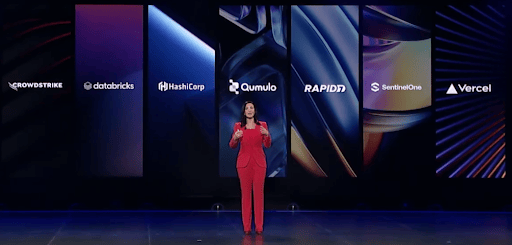Executive Summary
The upstream oil and gas industry is undergoing a data revolution, driven by sensors, high-resolution seismic surveys, and advanced drilling technologies. A single modern oil well can generate over 10 terabytes of data daily, while offshore platforms produce between 1 and 2 terabytes daily. Seismic surveys generate 10 terabytes or more per survey, creating massive data management challenges across remote wellheads, offshore rigs, and global headquarters.
Qumulo’s comprehensive edge-to-core-to-cloud architecture, enhanced by the cryptographically isolated multi-tenancy of the Qumulo Stratus platform, addresses these challenges. It enables high-performance, scalable, and secure data management from remote sites through core data centers to the cloud, empowering upstream operators to improve operational efficiency, safety, and data-driven decision-making.
The Upstream Data Challenge
Upstream operations generate vast amounts of data from optical fibers, sensors, and seismic activities. These datasets are large and geographically dispersed, complicating storage, access, and analysis. Despite the data volume, less than one percent is typically analyzed, limiting insights and operational improvements. Traditional cloud models often struggle with latency, security, and compliance across remote locations.
The Qumulo Edge: Revolutionizing Remote Operations
Qumulo’s edge infrastructure brings data storage closer to data sources, reducing latency and enhancing security. It supports continuous data streams from IoT sensors monitoring temperature, pressure, flow rates, and gas leakage, enabling immediate processing for safety and operational efficiency. Predictive maintenance is facilitated by local processing of sensor alerts, preventing costly downtime and maintaining safety in hazardous environments.
The Qumulo Core: High-Performance Data Center Operations
Qumulo’s core infrastructure handles the heavy computational demands of seismic data processing. Distributed file systems accelerate subsurface data processing up to three times faster than alternatives while reducing costs by 20-50%. The platform efficiently manages massive seismic files (25TB+), dramatically shortening interpretation cycles that traditionally take 12-18 months.
With concurrent NFS, SMB, and S3 interfaces, Qumulo Core supports both modern analytics and legacy applications on the same data, eliminating data silos and streamlining workflows.
The Qumulo Cloud: Global Collaboration and Scalability
Qumulo’s cloud-native solutions provide elastic, on-demand storage capacity, eliminating over-provisioning and enabling cost control. The Cloud Data Fabric creates a unified global file system spanning data centers and clouds, enabling instantaneous access and collaboration among geographically dispersed teams on exploration, drilling, and production activities.
Qumulo Stratus: Revolutionary Security for Upstream Operations
Qumulo Stratus introduces cryptographically isolated multi-tenancy, engineered for industries with stringent security needs. Announced in June 2025, it combines “shared-nothing” tenant segregation with cryptographically assured boundaries, ensuring complete data segregation, even from system administrators.
Developed with national intelligence agencies and compliant with NIST mandates, Stratus provides Zero Trust and Least Privilege access models. It incorporates AES 256-bit software-based encryption with official FIPS 140-2 Level 1 certification. All data and metadata are encrypted at the block level, with master keys securely stored and accessible only to root users.
Transforming Upstream Operations: The Art of the Possible
Accelerated Time-to-Oil with Enhanced Security
Qumulo’s platform reduces time-to-oil by enabling faster seismic interpretation and data processing while maintaining strict security. Efficient handling of large seismic files combined with real-time analytics and secure collaboration accelerates exploration and development decisions.
Secure Multi-Tenant Operations
Stratus enables upstream operators to maintain strict data isolation between business units, joint ventures, or regulatory jurisdictions without compromising infrastructure efficiency, thereby supporting secure multi-tenant environments.
Operational Excellence Through Secure Analytics
Qumulo’s real-time file system analytics help identify hot spots, large I/O requests, and response times, enabling administrators to optimize system performance. The platform enables easy data access from third-party systems, allowing them to quickly analyze information and deliver actionable business insights that support predictive maintenance, production optimization, and drilling efficiency.
Digital Transformation with Enterprise Security
The platform underpins digital transformation initiatives, supporting digital twins, IoT integration, and advanced analytics with enterprise-grade security and cryptographic isolation, protecting sensitive energy data and intellectual property.
Conclusion: Unleashing Upstream Potential
Qumulo’s edge-to-core-to-cloud architecture, enhanced by the Stratus platform, represents a paradigm shift for the upstream oil and gas industry. It addresses data volume, geographic distribution, operational complexity, and security, unlocking new levels of efficiency, safety, and competitiveness. This integrated, secure, and scalable solution transforms how upstream operators manage data, make decisions, and drive success in the modern energy landscape.
Call to Action
Ready to unlock new possibilities in Upstream Oil and Gas? Visit https://qumulo.com/industries/energy/ for more details, or connect with our Energy SMEs to discuss what’s possible for your organization.



